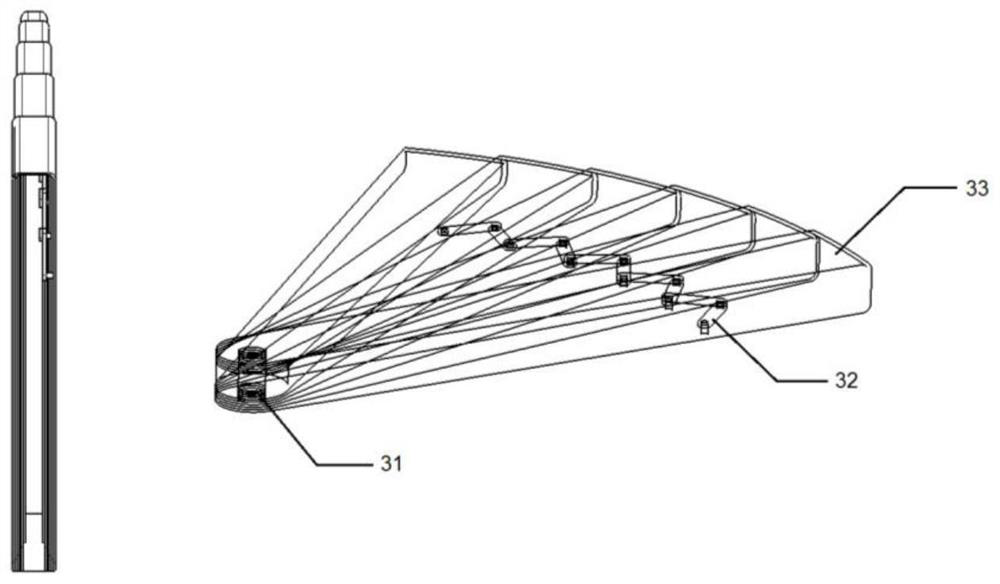A parachute system for aircraft recovery and landing recovery method
A recovery method and technology for an aircraft, applied in the field of parachute systems, can solve the problems of rocket landing impact, technical difficulty, and long cycle, and achieve the effects of horizontal recovery, maintaining stability, and avoiding overturning and winding.
- Summary
- Abstract
- Description
- Claims
- Application Information
AI Technical Summary
Problems solved by technology
Method used
Image
Examples
Embodiment 1
[0041] A parachute system for aircraft recovery, comprising a drogue parachute, a drogue sling, a drogue parachute front suspension point support, a drogue parachute rear suspension point support, a conversion sling, a drogue parachute rear suspension release bolt, a main parachute, and a main parachute Sling, main canopy front suspension point support, main canopy rear suspension point support, main canopy cover, main canopy cover unlocking bolt; figure 1 shown.
[0042] The suspension point support before the drogue parachute is installed on the main parachute hatch; the suspension point support after the drogue parachute is installed between the center of mass of the aircraft and the tail of the aircraft; the two ends of the drogue parachute hang respectively with The drogue parachute is connected to the rear suspension point support of the drogue parachute; the two ends of the conversion sling are respectively connected to the front suspension point support of the decelera...
Embodiment 2
[0047] A method for landing and recovering an aircraft, using the parachute system for aircraft recovery described in Embodiment 1, comprising the steps of:
[0048] S1. The drogue parachute goes out of the cabin, and the drogue parachute pulls the rear suspension point support of the drogue parachute through the drogue parachute belt to decelerate the aircraft; then turn to S2;
[0049] S2. After the aircraft decelerates to the preset main parachute opening speed, the deceleration parachute rear suspension point unlocking bolt separates the drogue parachute rear suspension support from the aircraft. Convert the sling to pull the front suspension point support of the drogue parachute to decelerate the aircraft; then turn to S3;
[0050] S3. When the angle of attack of the aircraft is greater than or equal to 35° or the angle between the conversion strap and the axis of the aircraft is greater than or equal to 35°, the main canopy canopy unlock bolt will separate the main canop...
Embodiment 3
[0052] A deformable recovery aircraft, comprising a rocket body, canards 3, wings, air rudders 9, gas rudders 10, a parachute system, a thrust reverser engine system, and a landing gear system; figure 2 shown. The canard 3 is telescopically installed on both sides of the rocket body; the wings are installed on both sides of the rocket body; the air rudder 9 and the gas rudder 10 are all installed on the rocket body, Both are used for flight control; the parachute system is used for the deceleration of the aircraft in the subsonic section; the thrust reverser system is used for the deceleration of the aircraft before landing; the landing gear system is used for the landing of the aircraft .
[0053] The canard 3 includes a motor-driven shaft 31, a folding link mechanism 32, and a plurality of wings 33; the plurality of wings 33 are connected through the folding link mechanism 32, that is, a plurality of wings 33 are stacked and set , the folding link mechanism 32 is installe...
PUM
 Login to View More
Login to View More Abstract
Description
Claims
Application Information
 Login to View More
Login to View More - R&D
- Intellectual Property
- Life Sciences
- Materials
- Tech Scout
- Unparalleled Data Quality
- Higher Quality Content
- 60% Fewer Hallucinations
Browse by: Latest US Patents, China's latest patents, Technical Efficacy Thesaurus, Application Domain, Technology Topic, Popular Technical Reports.
© 2025 PatSnap. All rights reserved.Legal|Privacy policy|Modern Slavery Act Transparency Statement|Sitemap|About US| Contact US: help@patsnap.com



